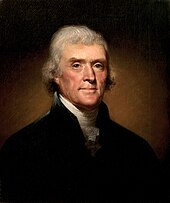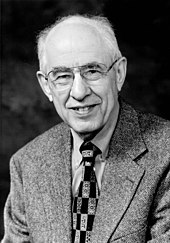Our website is made possible by displaying online advertisements to our visitors.
Please consider supporting us by disabling your ad blocker.
Philosophia Americana








Philosophia Americana est philosophica Americanorum agitatio vel fructus, intra et extra Civitates Foederatas factus. Internet Encyclopedia of Philosophy dicit philosophiam Americanam, cum "nucleo proprietatum definientium" caret, "nihilominus videri posse Americanam significationem sui communem per historiam civitatis repercutere et formare."[1][2]
Alexis de Tocqueville, auctor et historicus civilis, subtiliorem "Philosophical Method among the Americans" ('ratio philosophica inter Americanos') definitionem in primo paragrapho libri alterius Democracy in America ('Democratia in America') proposuit.[3]
- Puto homines in Civitatibus Foederatis philosophiae studere minus quam in ulla mundi civilizati civitate. . . . Nihilominus, facile est percipere paene omnes Civitatum Foederatarum incolas similiter intellegere et per easdem regulas administrare; hoc est, sine regulis rationis philosophicae definitis, unam tamen habent, omnibus communem. Eludere servitutem rationis et habitus, praecepta familiae, sententias classis, et aliquantum praeiudicatarum opinionum; traditionem agnoscere solum ut modus informationis, et res exstantis accipere solum ut exemplar actionis contrariae, ac melioris; petere causam rerum pro se, et solum in se; ad exitus inclinare sed ad rationem non ligatus, et ad substantiam per formam petere;—tales sunt proprietates principales quas rationem philosophicam Americanorum appellabo. . . . [In] plurimis mentis effectionibus, quisque Americanus exercitationem singuli solum intellegentiae suae petit.[4]
Ionathan Edwards "primum theologum philosophicum Americanum maximi momenti"[5] habetur.[6] Qui, propter homilias impigras, sicut "Sinners in the Hands of an Angry God," quae Magnam Excitationem Primam coepisse putatur, "absolutam Dei maiestatem et pulchritudinem sanctitatis Dei"[7] multitudinibus impressit.[6] Edwards, ut Platonismum Christianum cum epistemologia empirica coniungeret, physica Newtoniana adiuvante, penitus motus est a Georgio Berkeley, ipso empirico, ex quo Edwards momentum deduxit rerum incorporalium pro creatione experientiae humanae.
Nexus interni
- ↑ Anglice: "core of defining features, American Philosophy can nevertheless be seen as both reflecting and shaping collective American identity over the history of the nation."
- ↑ "American philosophy," in Internet Encyclopedia of Philosophy.
- ↑ Alexis Tocqueville, Democracy in America: Part the Second: The Social Influence of Democracy, conversus ab Henry Reeve (Philadelphiae: J. & H. G. Langley, Thomas, Cowperthwaite & Company, 1840), 1.
- ↑ Anglice: "I think that in no country in the civilized world is less attention paid to philosophy than in the United States. . . . Nevertheless it is easy to perceive that almost all the inhabitants of the United States conduct their understanding in the same manner, and govern it by the same rules; that is to say, that without ever having taken the trouble to define the rules of a philosophical method, they are in possession of one, common to the whole people. To evade the bondage of system and habit, of family maxims, class opinions, and, in some degree, of national prejudices; to accept tradition only as a means of information, and existing facts only as a lesson used in doing otherwise, and doing better; to seek the reason of things for one’s self, and in one’s self alone; to tend to results without being bound to means, and to aim at the substance through the form;—such are the principal characteristics of what I shall call the philosophical method of the Americans. . . . [In] most of the operations of the mind, each American appeals to the individual exercise of his own understanding alone."
- ↑ Anglice: "America's most important and original philosophical theologian."
- ↑ 6.0 6.1 Stanford Encyclopedia of Philosophy, "Jonathan Edwards," primum prolatum 15 Ianuarii 2002; multo retractatum 7 Novembris 2006.
- ↑ Anglice: "the absolute sovereignty of God and the beauty of God's holiness."
Previous Page Next Page


